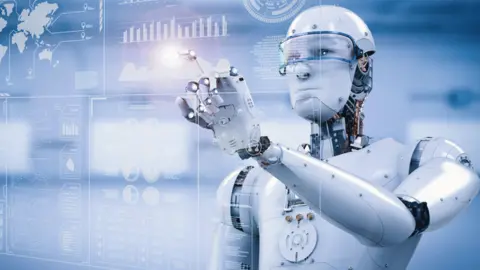AI ripe for exploitation, experts warn
 Getty Images
Getty ImagesDrones turned into missiles, fake videos manipulating public opinion and automated hacking are just three of the threats from artificial intelligence in the wrong hands, experts have said.
The Malicious Use of Artificial Intelligence report warns that AI is ripe for exploitation by rogue states, criminals and terrorists.
Those designing AI systems need to do more to mitigate possible misuses of their technology, the authors said.
And governments must consider new laws.
The report calls for:
- Policy-makers and technical researchers to work together to understand and prepare for the malicious use of AI
- A realisation that, while AI has many positive applications, it is a dual-use technology and AI researchers and engineers should be mindful of and proactive about the potential for its misuse
- Best practices that can and should be learned from disciplines with a longer history of handling dual use risks, such as computer security
- An active expansion of the range of stakeholders engaging with, preventing and mitigating the risks of malicious use of AI
Speaking to the BBC, Shahar Avin, from Cambridge University's Centre for the Study of Existential Risk, explained that the report concentrated on areas of AI that were available now or likely to be available within five years, rather than looking to the distant future.
'Game changer'
Particularly worrying is the new area of reinforcement learning where AIs are trained to superhuman levels of intelligence without human examples or guidance.
He outlined some of the scenarios where AI could turn "rogue" in the near future:
- Technologies such as AlphaGo - an AI developed by Google's DeepMind and able to outwit human Go players - could be used by hackers to find patterns in data and new exploits in code
- A malicious individual could buy a drone and train it with facial recognition software to target a certain individual
- Bots could be automated or "fake" lifelike videos for political manipulation
- Hackers could use speech synthesis to impersonate targets
Miles Brundage, research fellow at Oxford University's Future of Humanity Institute, said: "AI will alter the landscape of risk for citizens, organisations and states - whether it's criminals training machines to hack or 'phish' at human levels of performance or privacy-eliminating surveillance, profiling and repression - the full range of impacts on security is vast.
"It is often the case that AI systems don't merely reach human levels of performance but significantly surpass it.
"It is troubling, but necessary, to consider the implications of superhuman hacking, surveillance, persuasion, and physical target identification, as well as AI capabilities that are subhuman but nevertheless much more scalable than human labour."
Dr Seán Ó hÉigeartaigh, executive director of the Centre for the Study of Existential Risk and one of the co-authors, added: "Artificial intelligence is a game changer and this report has imagined what the world could look like in the next five to 10 years.
"We live in a world that could become fraught with day-to-day hazards from the misuse of AI and we need to take ownership of the problems - because the risks are real.
"There are choices that we need to make now, and our report is a call to action for governments, institutions and individuals across the globe.
"For many decades hype outstripped fact in terms of AI and machine learning. No longer. This report looks at the practices that just don't work anymore - and suggests broad approaches that might help: for example, how to design software and hardware to make it less hackable - and what type of laws and international regulations might work in tandem with this."
The 100-page report identified three areas - digital, physical and political - in which the malicious use of AI is most likely to be exploited.
Contributors included OpenAI, a non-profit research firm, digital rights group The Electronic Frontier Foundation and the Center for a New American Security, a national security think-tank.
